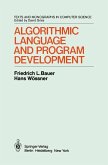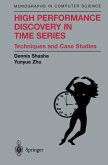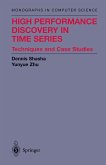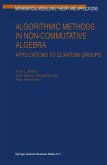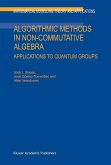Where as Kolmogorov complexity is the accepted absolute measure of information content of an individual finite object, a similarly absolute notion is needed for the relation between an individual datasample and an individual model summarizing the information in the data for example, a finite set (or probability distribution) where the data sample typically came from. The statistical theory based on such relations between individual objects can be called algorithmic statistics, in contrast to classical statistical theory that deals with relations between probabilistic ensembles.
'Algorithmic Statistics' develops the algorithmic theory of statistics, sufficient statistics, and minimal sufficient statistics. This theory is based on two-part codes consisting of the code for the statistic (the model summarizing the regularity, the meaningful information, in the data) and the model-to-data code. In contrast to the situation in probabilistic statistical theory, the algorithmic relation of (minimal) sufficiency is an absolute relation between the individual model and the individual data sample. The book distinguishes implicit and explicit descriptions of the models and gives characterizations of algorithmic (Kolmogorov) minimal sufficient statistic for all data samples for both description modes in the explicit mode under some constraints. It also strengthens and elaborates upon earlier results on the "Kolmogorov structure function'' and "absolutely non-stochastic objects'' those rare objects for which the simplest models that summarize their relevant information (minimal sufficient statistics) are at least as complex as the objects themselves. Whereas Kolmogorov complexity is the accepted absolute measure of
information content of an individual finite object, a similarly
absolute notion is needed for the relation between an individual data
sample and an individual model summarizing the information in the data
---for example, a finite set (or probability distribution) where the
data sample typically came from. The statistical theory based on such
relations between individual objects can be called algorithmic
statistics, in contrast to classical statistical theory that deals
with relations between probabilistic ensembles.
'Algorithmic Statistics' develops the algorithmic theory of
statistics, sufficient statistics, and minimal sufficient statistics.
This theory is based on two-part codes consisting of the code for the
statistic (the model summarizing the regularity, the meaningful
information, in the data) and the model-to-data code. In contrast to
the situation in probabilistic statistical theory, the algorithmic
relation of (minimal) sufficiency is an absolute relation between the
individual model and the individual data sample. The book
distinguishes implicit and explicit descriptions of the models and
gives characterizations of algorithmic (Kolmogorov) minimal sufficient
statistic for all data samples for both description modes--in the
explicit mode under some constraints. It also strengthens and
elaborates upon earlier results on the ``Kolmogorov structure
function'' and ``absolutely non-stochastic objects''--those rare
objects for which the simplest models that summarize their relevant
information (minimal sufficient statistics) are at least as complex as
the objects themselves.
Hinweis: Dieser Artikel kann nur an eine deutsche Lieferadresse ausgeliefert werden.
'Algorithmic Statistics' develops the algorithmic theory of statistics, sufficient statistics, and minimal sufficient statistics. This theory is based on two-part codes consisting of the code for the statistic (the model summarizing the regularity, the meaningful information, in the data) and the model-to-data code. In contrast to the situation in probabilistic statistical theory, the algorithmic relation of (minimal) sufficiency is an absolute relation between the individual model and the individual data sample. The book distinguishes implicit and explicit descriptions of the models and gives characterizations of algorithmic (Kolmogorov) minimal sufficient statistic for all data samples for both description modes in the explicit mode under some constraints. It also strengthens and elaborates upon earlier results on the "Kolmogorov structure function'' and "absolutely non-stochastic objects'' those rare objects for which the simplest models that summarize their relevant information (minimal sufficient statistics) are at least as complex as the objects themselves. Whereas Kolmogorov complexity is the accepted absolute measure of
information content of an individual finite object, a similarly
absolute notion is needed for the relation between an individual data
sample and an individual model summarizing the information in the data
---for example, a finite set (or probability distribution) where the
data sample typically came from. The statistical theory based on such
relations between individual objects can be called algorithmic
statistics, in contrast to classical statistical theory that deals
with relations between probabilistic ensembles.
'Algorithmic Statistics' develops the algorithmic theory of
statistics, sufficient statistics, and minimal sufficient statistics.
This theory is based on two-part codes consisting of the code for the
statistic (the model summarizing the regularity, the meaningful
information, in the data) and the model-to-data code. In contrast to
the situation in probabilistic statistical theory, the algorithmic
relation of (minimal) sufficiency is an absolute relation between the
individual model and the individual data sample. The book
distinguishes implicit and explicit descriptions of the models and
gives characterizations of algorithmic (Kolmogorov) minimal sufficient
statistic for all data samples for both description modes--in the
explicit mode under some constraints. It also strengthens and
elaborates upon earlier results on the ``Kolmogorov structure
function'' and ``absolutely non-stochastic objects''--those rare
objects for which the simplest models that summarize their relevant
information (minimal sufficient statistics) are at least as complex as
the objects themselves.
Hinweis: Dieser Artikel kann nur an eine deutsche Lieferadresse ausgeliefert werden.


